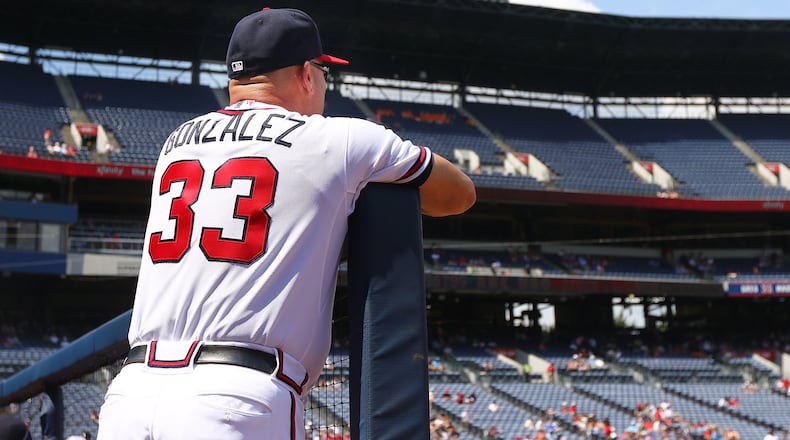Even if there were still such things as pennant races, the 2015 Braves wouldn’t be in one. They awoke on Labor Day having won once in three weeks. (Here we note that the Braves play baseball – if we can deem what they’ve been doing as actually playing – where there’s a game most every day.)
We’ve seen lousy Braves teams before. The 1988 edition started 0-10 and finished 54-106. The 1977 club lost 17 in a row, Loss No. 17 being skippered by Ted Turner, who’d just bought the team and who told manager Dave Bristol to take two weeks off. (Tons-of-fun commissioner Bowie Kuhn nixed the Ted-as-manager bit after one game.) The 2011 team went 9-18 in September and blew a playoff spot. The 2014 edition went 7-18 in September and got its general manager fired.
To their discredit, these Braves have positioned themselves to make a special memory. They could become the first team in baseball history to lose 100 games after being .500 more than halfway through a season.
We say again: The first team in baseball history.
Credit reader Jimmy Smith for posing the question. After two hours of clicking around on Baseball Reference, I had the answer. The Braves were 42-42 through July 7. No 100-game loser – I checked the game-by-game results of each, dating back to the 1889 Louisville Colonels, the first team to crack triple figures in L’s – has been anywhere close to .500 so deep into a season.
Only one 100-game loser was within even eight games of .500 with 84 played – the 1961 Washington Senators, technically an expansion team because the incumbent Senators moved to Minnesota, were 38-46. They finished 61-100.
(The 1889 Colonels, you’ll be intrigued to know, were 19-65 after 84 games. They finished 22-111 in the American Association, won by the Brooklyn Bridegrooms. The Colonels went through four managers. One of the four was the player-manager Chicken Wolf. His full name: William Van Winkle Wolf. He had a mustache.)
Even having lost 19 of 20 and 41 of 53, the Braves aren’t quite on pace to lose 100 games. As of Monday morning, their winning percentage was .394. At that rate, they’d finish 64-98. To make history, they’d have to play .320 ball from here on. They’d have to lose 17 of their remaining 25.
Counting Monday night’s encounter, they had six remaining against Philadelphia, which has hung within a game of the Braves despite winning only once in a week. There are three left with Miami, which has flown past the Braves to establish a three-game hold on third place in the National League East. The other 16 games will come against teams bound for October or trying to get there.
The season’s final series will come against St. Louis, which will have clinched the league’s No. 1 seed and will surely be resting regulars. Really, though, will it matter? The Braves have lost 12 in a row, nine coming by four or more runs and three by double figures. If that’s competing, my name’s Chicken Wolf.
Nobody expected the Braves to win at the same rate after their July sell-off, but it’s not as if they dumped Freddie Freeman and Shelby Miller. Juan Uribe and Kelly Johnson found work only because this team was strapped for hitters. Jose Peraza hadn’t played a big-league game. Jim Johnson was closing because Craig Kimbrel was traded and Jason Grilli tore his Achilles. Alex Wood is a good young pitcher, but aren’t the New Braves hip-deep in young pitching?
That’s the scary part. The touted pitchers who’ve come to the majors – we stipulate that many remain in the minors – have gotten worse the more they’ve thrown. We ask, not for the first time: Is Roger McDowell the right pitching coach for a staff that figures to be laden with young arms for the next five years?
The Braves have committed to this manager and these coaches through 2016. (I sense no softening in that organizational position.) Still, if this bunch goes from .500 to 100 losses, we have to ask: How many Epic Collapses can Fredi Gonzalez survive? No, he doesn’t have much of a team, but even the 1962 Mets never lost 19 of 20. You could look it up.




